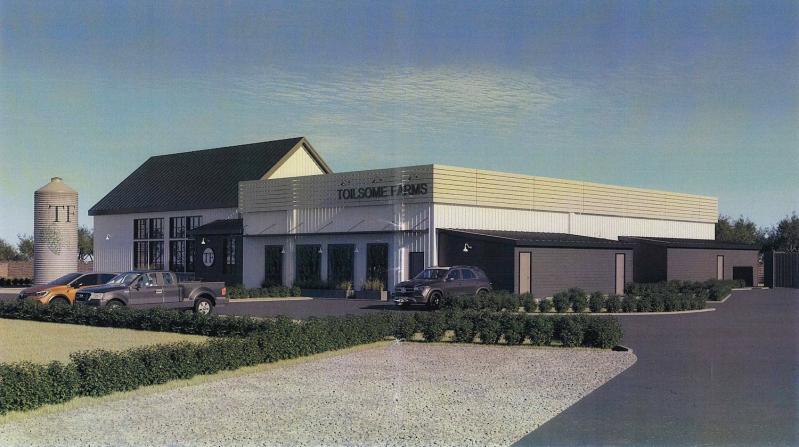Updated plans for the proposed Toilsome Farm Restaurant and Brewery are circulating at the East Hampton Village Design Review Board, and a neighbor who has already sued over the proposed project is raising alarms again.
A date has not yet been set for the revised plans to be discussed publicly by the board, but Michael Aaron, the neighbor, has already submitted a letter registering his opposition.
Mr. Aaron sued the village’s zoning board of appeals in 2021 for allowing what he called a “beer hall” in a residential area on Toilsome Lane. His suit was deemed premature and was tossed.
In his recent letter to the D.R.B., he said that the reason for his continued opposition is that Mill Hill Realty, which owns the property, “could use ‘special event’ permits TO ELIMINATE any protection the residential neighbors would have from uncontrolled, unwanted noise and loud music from outdoor speakers as well as live music that would bring vast crowds of partygoers to our area, disturbing the peace and diminishing our quality of life.”
The proposed restaurant and brewery would have 129 seats (60 outdoors and 69 indoors) and a 61-space parking lot. Roughly 70 percent of the 9,978-square-foot building (6,954 square feet) would house the restaurant, while the remainder would be used for brewing beer. (A 2,096-square-foot basement is not included in square footage calculations, but would include a walk-in cooler, storage, and elevator.)
A large sycamore maple will be removed and replaced with 35 “green giant” arborvitae and 15 cryptomeria. A conventional septic system is planned, designed to handle 3,236 gallons of waste per day.
The last time the application was in front of the D.R.B., a subcommittee was formed to discuss design elements. (The board and batten siding will be painted dark gray. The remainder of the building will be clad in cedar shingles, and the roof will be metal.) In his letter, Mr. Aaron calls for a similar subcommittee, this one including neighbors, to understand how noise and special event permits will impact the neighborhood.
A six-foot sound-attenuation wall that has been added to the plans, a suggestion by Sound Sense, an acoustical engineer hired by Mill Hill, has not been enough to ease Mr. Aaron’s noise-related concerns.
Because the site plan has not been deemed complete by the D.R.B., it is not clear what the maximum occupancy of the restaurant and brewery will be. Mr. Aaron imagines hundreds of standing patrons drinking beer and listening to live music, walking among fully occupied tables.
“Common sense says if you have a 4,000-square-foot restaurant with only a few inside tables, you have a lot of room for capacity,” he said when reached on the phone. “Capacity outside, who knows what that could be?”
Marcos Baladron, the village administrator, said capacity will be determined by the Suffolk County Health Department, based on septic flow rates, and by the fire marshal, but that parking alone would help limit capacity.
Mr. Aaron disagreed. “Parking does not limit capacity. Parking is permitted on Toilsome, and you have parking on Maidstone and parking at the railway station. All these places are poorly lit at night. They’ll be walking on roads. It reminds me of the Surf Lodge in Montauk. They say there has never been an accident on the blind curve. This is a formula to create an accident.”
“My little signature on a special event permit doesn’t get anyone around capacity rules,” said Mr. Baladron. “It’s not a passport for rowdiness. That’s not what it is. It’s really a temporary lift on limits. For example, maybe a restaurant that can only seat 120 needs to hold 200 for an event, with some people standing. The special event permit gets blessed by everyone. The Police Department and the fire marshal both sign off before it gets to me. We deny a lot of stuff that’s over capacity.”
“Mill Hill can apply for special event permits every weekend,” writes Mr. Aaron in his letter to the D.R.B., “enabling them to have indoor and outdoor rock concerts or whatever they choose, leaving the neighbors no protection from invasive noise.”
However, Mr. Baladron pushed back on that worry. “We’ve limited the number of special permits a commercial business can apply for to no more than 10 per year. Any time an event holds over 50 people, a permit is required, especially if it’s outside an establishment’s regular scope of business. There’s no way they’d be able to have the type of parties he’s referencing at that location. I wouldn’t allow it.”
While the entities are vastly different, Alex Balsam, the lawyer representing Mill Hill Realty, says an application he ushered through the village boards for the Jewish Center of the Hamptons raised similar special event concerns with neighbors. Like the Jewish Center, he said the restaurant and brewery will have a speaker system that is professionally designed and limited to prevent sounds from crossing into the neighboring residential zone.
He has met with Mr. Aaron multiple times to hear his concerns and discuss the application.
“If we have any event that doesn’t plug into that sound system, with its own built-in limitations, that would trigger a special event permit. We want to regulate the result, not the process. We’re looking to avoid covenants. I’d rather say, ‘Look, we know the parameters. We can’t be a nuisance. We have to go to the village for any events.’ If we’re a nuisance, we would expect to not be approved.”
“When you look at uses that could be put in by other people, this is a beautiful project that at the end of the day neighbors will be thankful for. It’s not becoming a masonry yard or an auto repair shop. Our goal is for Mr. Aaron to have a big smile on his face when he comes to our friends and family opening,” said Mr. Balsam.
But that’s still way down the road. The D.R.B. first needs to approve the site plan. Then Mill Hill can apply for a building permit. That’s when Joseph Palermo, the new chief building inspector for the village, will be able to opine if a brewery is a compatible use in a residential district.




